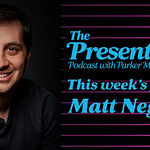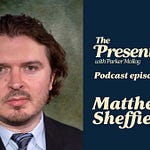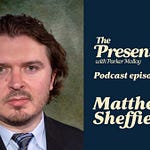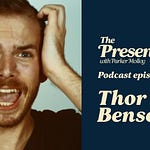Welcome to this week’s edition of the Present Age podcast. I’m your host Parker Molloy.
Joining me on today’s show is the man behind what I’ve long referred to as “the only good government Twitter account.” His name is Joe Galbo, and he’s the social media specialist at the U.S. Consumer Product Safety Commission.
Parker Molloy: Joining me today is Joe Galbo. Joe, what is it that you do?
Joe Galbo: Sure. Well, I make memes for the government. No, so yeah, I am the Social Media Specialist at the Consumer Product Safety Commission. We're a small, federal agency, about 500 employees, with a budget of about $137 million dollars, and we regulate consumer products, so everything from ATVs to toaster ovens, to children's clothing, basically thousands and thousands of things people use every single day, and we're the agency that makes sure those things are safe.
It's not just product updates. It's not just recall updates, it's a lot of awesome memes. That is what drew me to the account, not my love of product recall.
Sure.
You have a bunch of characters in these memes. Can you tell me a little bit about how that got started? How did you pitch the idea of creating Quinn the Quarantine Fox, and your various other ...
Handsome Ron.
Handsome Ron, yeah.
Copernicus Jackson, yeah sure. Right from when I interviewed at the agency, back in, it was June 2016, which is basically a lifetime ago for everyone at this point. I explained to my supervisors at the time, "Hey, I want to join the agency. I want to do public education campaigns, but it's not going to look necessarily the way you all have been doing things." They were cool with that, to their credit. Right from the get go, there was an understanding that, "Hey, we're going to do something and it's going to look a little bit different."
I don't think they anticipated so many talking animals at the time, and to be fair, I don't think I anticipated that either, but as I explored the agency's messaging and the types of things we were trying to educate people about, it became very clear to me that our guidance to people, how people could live a little bit safer, all came across very standard, and a little bit boring, so again, wear a bike helmet, when your message is wear a bike helmet, or don't plug your space heater into a power strip, that's good advice, but it's not necessarily the most exciting advice.
When you're out there on the Internet, and you're up against celebrities and influencers, and every brand is trying to be funny, if you just go out there and start telling people to make sure they clean their dryer vent lint, the lint out of their dryer vent, you're not going to be very successful.
I think the strategy really came out of looking at what our messaging was, and then again, seeing how simplistic it was, and saying, "Okay, if this has any chance at all of making it out there online, we're going to have to go big and bold, and we're going to have to do things in a super fun way."
Now, as far as pitching characters individually, it's one of these situations where if I have a good idea for a new character, I'll go try to find a stock photo that supports that. With Copernicus Jackson, who's one of our cat characters, I knew I wanted a great cat character, and it really was just a matter of finding a good stock photo that represented a cat, that looked excited and interested in something, but not terrified of something. That was a lot of time searching through a stock site to find it, and then once I did, coming up with the name, again it's, a lot of times it's about, "Hey, have I heard this character name out there before," and if the answer is no, then okay, can we try it. It's a lot of Googling to make sure I'm not reusing character names that exist anywhere else.
Yeah, it is a little bit, I want to say ad hoc, because there's definitely strategy there, but it's very organic. Again, I'll try to leverage training topics a lot, so if there's an animal trending or something, I'll try to come up with a character in that moment. Yeah, it's a little bit a mix of method and then all over the place madness for sure.
One of the reasons that I really just love the account, generally, and this is a big part of what I'm trying to do with this newsletter, and this podcast. I'm really focused on the way that we communicate, and yours is one of the most interesting communication strategies I've seen, especially when it comes to something that comes from the government. You really expect, when you think government Twitter account, you think it's sterile, straightforward, just telling you what you need to know. Meanwhile, it's, "Hey, here's an ATV and a T Rex." All of that stuff that really just, it gets people drawn in, the response to your Tweets is just phenomenal.
It's always funny seeing people who are encountering it for the first time, going, "Did you get hacked?" Oh no.
We do get that one a lot, yeah. I think things have changed. Communication has changed, and I don't want to sound like a cliché, but the past decade, forget about it. Everything's different, and even the past five years it feels, to me, it feels like things are very different. The government, just the way it operates, where everything has to be by the book and by the law. By its nature, it is slower than the private sector. A functional government will be mostly slower than the private sector moves, and in communication, again where things move twice as fast in every other industry, yeah it can feel like, again, a lifetime.
I think one thing that we really struggle within government, and I've had a chance to speak to a lot of people in government at this point, who do communication, there is that constant tug of war between, "Hey, we have to be an authoritative voice, and people have to trust us, and we have to get the message out there in a really clear way." What you were just speaking to, which is it's also very boring when you just do that, straightforward. The Internet is not designed for boring content, which I guess is not a thing that people meditate on very often, but I think part of it too is at a small agency like CPSC, where our budget is, again, only about $137 million, which in government money is not a lot at all, compared to the FDA or the CDC, where you're talking billion-dollar budgets and more. You just can't do it the boring way online, you just can't.
I do think government helps itself when it’s very relatable to people, and I think that's one thing that we hear a lot about this strategy is that it's not preachy. It's not coming at you in a way where, from a place of high authority. Again, it is advising you on a better way to live your life a little more safely, but it's not doing it from a pulpit. It's not going it from an ivory tower. It's down here with the regular people, where regular people like talking dogs, and regular people like robots that go on picnics with their friends. Again, I don't know, at least those are the things I think regular people like.
Like you said, it seems to be working so far, and we're just very grateful for that, honestly.
Yeah, of course. I'd say for about a year or two I'd see your Tweets and just be like, "What is going on inside this person's head?" It's great to actually talk to you, and to be like, "Oh look, this is a human being, who seems to share the same sense of humor as me," and other people seem to be into it as well.
Yeah. I guess one thing about me, I love working in communication. Back in the day, I wanted to be a journalist, but I graduated from college in 2008, where being a journalist would have been very difficult at the time. I fell into this government communication thing through advertising. In my heart, I always fantasize about being a TV showrunner, like on an animated series. That, to me, is the most fun you could probably have in a job.
In some ways, what people are seeing here is the Joe Galbo version of what a TV show might look like.
Right.
A lot of these memes could easily be turned into PSAs or video products, and that's not an accident. My passion lies in visual storytelling, and I do try to inject a lot of narrative into these things, to a point where sometimes it's like my supervisors are like, "I don't know, is this one maybe too complicated for people?" I'm always like, "No, trust the audience, they're going to get it." More often than not, they let me go that route.
Again, it is a delicate balance, and I think one of the things I like about the, I guess you could call it a template we use now, is that at the top there, where we have the narrative or the crazy visual, you can almost do whatever you want at this point, and then as long as at the bottom you're delivering that safety message that's going to help save lives.
Yeah.
That's one thing that's been super fun, and now it's really just trying to push us in new and exciting ways. We just started doing LGBTQ graphics a short time ago, and that's been very exciting. It's one of these things where, again, not that we've pushed the envelope in government communication, how do we keep pushing it, and how to we keep making sure we're getting these messages in front of people, on an Internet that is constantly more fractured by the year.
Yeah, and everything is constantly changing, and what works today might not work next year, next month, or next week. I don't know, have you watched the Netflix show, I Think You Should Leave?
No, not yet. I haven't yet.
Okay, you should watch that, because it's like the TV show version of what you do, just weird, out there. What you do is a combination of that show and Portlandia, which I mean as a compliment.
Thank you. No, you're actually ... One of my very best friends told me to start watching that show, so you are totally in line there. Now I'm going to definitely have to watch it.
Yeah, I think you'll like it. I think it will be right up your alley.
That's awesome, thank you. I think, again, it is that fine line of being referential to things that are going on in pop culture, because you always, and this is just something everybody's online trying to do, you always want to see you're on top of what's going on. You want to see, again, of the world that people actually live in, and that in itself is a new idea for government.
I think a lot of government agencies are just, "Hey, we're important and here's our stuff, and you shall appreciate it because it's coming from us." That's not my, our approach at all. In a lot of ways, it's the exact opposite, where I very much feel like every day we have to prove our worth, and prove our value to the public, so every day people are going to get the best of what we got from a creative perspective.
Then yeah, again getting back to how different things are, just trying to keep up with it all. Looking out, I know we should be on TikToc right now.
Oh yeah.
I know we're going to need a really great video strategy like yesterday, but on a small team it's like, "Okay, what do we do?" There's one person at CPSU who's responsible for producing the social media, and we do have a video production specialist, thank God. They're going to, hopefully, play a big role in what our short-form video strategy is someday. Yeah, it's just, again, thinking about how government tends to move just a little bit slower than the private sector, keeping up is just a constant battle.
Well yeah, and with government generally, there's always this sort of worry that you're not getting through to people, that you come off as sterile.
Totally.
That you come off as preachy and telling people how they should live their life, what they should do, with the exception of, "Hey, maybe you shouldn't have this dresser that's not anchored to the wall," that's fair.
Yeah, exactly. Especially at a regulatory agency like us, so we are very similar to the EPA or the FDA, or the CDC in that there are things that we are responsible for making safe. Some agencies don't have that, like NASA doesn't regulate anything. The Interior Department and the National Park System, they don't regulate anything. When you look at the history of interesting government social media accounts, the grandfather of it all was the TSA account, who was run by ... TSA Instagram account, that was run by a gentleman by the name of Bob Burns, who has sadly passed away.
I remember reading Bob's captions on the TSA Instagram photos back in 2013, 2014, and at the time it was super innovative for government, because it was super fun and super ... Again, it was for people.
Oh yeah.
It wasn't a government agency being on social media because it was the thing to do. They were really trying to do something different there. I remember distinctly sitting, I was at the Liberty Stein Center in Jersey City, New Jersey at the time, doing social media there. I remember very distinctly sitting there and reading an article about their Instagram, and thinking, "Oh wow, you can do interesting work in government." Funny enough, just a few years later, I'd be at CPSC, walking into a room, pitching a unicorn, talking about fire alarm safety. Yeah, it's been a lot of fun.
There's a lot of other great government social happening now. I do hope, I see it sometimes where people will find our account, and then they'll say like, "Oh well this looks like the IRS Instagram," or "This kind of looks like ..." There's a lot of great local government, social media happening. You could do a whole podcast just on that.
Oh yeah.
Yeah.
Well that was one thing I wanted to ask, was what other agencies are doing social media in a good way, I guess?
There's interesting stuff happening all the time. You have agencies like NASA, where they are comparable to any of the giant brands you see out there. Their reach and their social media power is just as good as any ... Name any Fortune 500 company and NASA's right up there. Their stuff is very good, obviously. They have a ton of resources. They have a ton of great people who work there. I think the IRS, some of the lesser-known ones, so the IRS has a really fun Instagram account. Another lesser-known one, there's a COVID-19 response committee that was set up to make sure that money being spent through the COVID programs that the government is putting together is being spent wisely and legally. They have a very fun Twitter account, and I'll try to remember the name of that, or I'll send it to you, and maybe you can put it in the newsletter somewhere.
Oh yeah.
The Interior Department's been doing fun stuff for a long time. They do Fat Bear Week, which is like, again, some of the most fun you can have with government social, where they just have people rate very large grizzly bears. There's other great stuff out there. I think no one's really as absurdest as we are, and I think that's the thing that we brought. Again, when we talk about how we've moved things forward, a lot of people say this is like just a total, they call it a vaporwave, or shitposting, or that type of thing. I guess it does feel like that to people sometimes.
Talking about, just to go back to something you were talking about earlier, I'm a big proponent of doing what works, because things do change so quickly, so what I say to people all the time is, "We're doing this strategy now because it works now, but the day it stops working, we will just do something else," because that's how you stay effective in communication. Again, I do think that's the only way to approach it, because things change so quickly.
Yeah, absolutely. I have two final questions for you that I wanted to jam into one super question.
Sure.
That is one, if you could take over any government Twitter account, and implement your own kind of strategy, what would it be, and two, which of the characters that you've created is your favorite, if you have one?
Sure, so I'll start with the second question first. Favorite character is tough, because I love all of them, which is a weird thing to say. I think over time, the Pets United for Human Safety, which includes Potato the Dog and Copernicus Jackson, and I think Handsome Ron, over time those three have really emerged as my go-tos, and I guess my most, our most reliable partners in this communication strategy.
Some of our older characters, Barks McWoofins was a character we used a few years ago, that retired officially to Hawaii, and I'll always have a special place for Barks McWoofin. Quinn the Quarantine Fox, who again was really not meant to be around this long, but is about to have a rebirth, or have to come back in a bigger way, because of just what's going on these days with the Delta Variant, so yeah. I think those three, Copernicus Jackson, Potato the Dog, and Handsome Ron. If I had to pick three that I'd want on a team at all times, it would be them.
Yeah, it's a good choice.
Yeah, and then to your first question, CPSC has played a role in the pandemic in making sure consumers are aware of the issues and the things that could hurt them in their home, and obviously with people spending more time at home, that became a very important thing for us to focus on, and we're still very much focused on it. Again, nothing has really changed for us, as far as the pandemic goes. We're still operating in a pandemic first sort of mentality.
I think if I could pick any other account, it would be a government account and I probably would pick either the HHS account or some of the CDC accounts. I would like to see what this meme strategy could do with pandemic messaging in a more broader sense. I think that would be, that would be an interesting experiment to me. Again, the people over there are doing amazing work, and I know some of them. I've met a bunch of them at this point, and I have so much respect for everything they've done to date, and I think they're doing an incredible job, so again, it's not, that wouldn't be coming from a sense of like, "Well what they're doing hasn't been effective." I think it's been incredibly effective, but again, I would love to see, if we had some more talking animals around here, with the pandemic, would we win the conversation war in a more resounding way? I think that would be something I'd love to try.
“Quinn the Quarantine Fox is very disappointed in you for not getting vaccinated yet.”
Exactly, or hey, here's the wild animals united for human safety to tell you about how the vaccine is safe.
Yeah.
I think that's something that, again, I haven't even seen it at local health departments, but some of that old-fashioned stuff, some of that like, "Hey, here's a friendly animal spokesperson that's going to calmly ..."
Yeah, like Smokey the Bear and stuff.
Yeah, I think there's still a place for that, and it's funny because so many of our characters almost came out of me wanting to poke a little bit of fun at those traditional characters, like Smokey the Bear, who again is still around. The content they're creating is still very good, if you ever engage with it, but I do think people still have a soft spot for that, and they still like it on some level.
I guess it just goes to show you, the more things change, the more they stay the same sometimes. Yeah, so ...
Well yeah, I mean in the case of Smokey the Bear, for instance, you have this ... Smokey the Bear, that stands out. That has burned itself into all of our collective memories, everyone knows Smokey. I wonder if 10, 15 years from now people are going to be like, "Man, remember Handsome Ron?"
Yeah, oh man I could only hope so. It's one of those things, we have this collaboration with the Library of Congress now, where I send them our memes and the memes get archived in the Library of Congress with descriptions that I've written, that get into the strategy behind them.
I do hope, and every creative person hopes that their work has longevity, past their lifetime, and obviously if that were to happen for these characters, that would be incredible. I don't expect that, just to be clear, but I do think when you look, again, Smokey the Bear, that was a campaign created with the Ad Council, one of the best advertising groups in the world, all these years of funding, and especially with climate change affecting things. Smokey the Bear is prime to become much more important in the future than they ever were in the past, which is crazy to think about.
Yeah.
That's what government can do. It's the longevity of your characters. It's the longevity of commitment of an issue where government can really shine. I do hope that we have some of that. I do hope that, at some point, my time at CPSC will come to an end, and I do hope that people, at least appreciate these characters and keep learning from them after I'm no longer here.
Yeah, that's a ... I think that's probably a good way to wrap it up. Is there anything else that you'd like to add to this?
Oh, I guess I would just encourage everyone, if you haven't, to subscribe to get recall emails. You can do it right on our website. It's free. It's very easy. Again, if you're not following us on social media, please consider following us on Twitter and Instagram and Facebook. We do have an Instagram account where we don't repost things as much. One of the complaints about our Twitter account is I don't constantly repost things. It's just because I'm one person folks. It's not because ... It's not laziness, it's just the ability of one person to come up with stuff on a daily basis.
I would definitely encourage you to follow us on Instagram, or Twitter, or Facebook, and again, just hope everyone ... One thing we talk about all the time is that we do a very serious thing at CPSC, and on social media it's presented in a very fun way. I do hope folks just take a minute to think about their safety in their own lives. These are small things that you can do that could really, really be lifesaving. Having a fire extinguisher in your kitchen, making sure your carbon monoxide batteries are changed regularly. There's a lot of common sense stuff here that, when you're busy or you're stressed, which we all have been over the past year, if you just take an extra second to think about it, it could save your life down the road. I just really encourage everyone to take those things seriously, and revisit our messaging as much as you need.
Yeah, I'm going to be sure to ... I really want to encourage anyone who's listening to this, to go and check out the transcript that I'm going to have in the newsletter itself, because I'm going to be sure to include all sorts of links, all sorts of embedded Tweets in everything, just because this is really one of those things you have to see to understand what on earth we've been talking about today.
Yeah, that's a good way to put it. Parker, I do want to thank you for your support over the years. You've been, again, even in my darkest moments, I always thought, "Oh, well at least Parker's out there re Tweeting our stuff sometimes.”
Of course, it's always fun. I tried to make a habit of quote tweeting and just being like, "Only good government Twitter account," even though it's not the only good one.
Which I very much appreciate. Yeah, thank you, truly. Truly, thank you. Really, we're just so grateful, so thank you.
Yeah, thanks so much for joining me today, Joe.






















